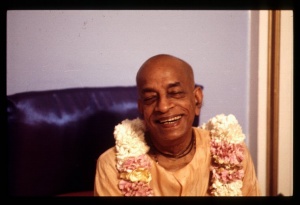SB 1.18.28 (1965)

A.C. Bhaktivedanta Swami Prabhupada
TEXT No. 28
Alabdha trina bhumyadir asamprapta argha sunritah Avajnatam iva atmanam manyamanas chukopa ha.
ENGLISH SYNONYMS
Alabdha—having not received, Trina—seat of straw, Bhumi—place, Asamprapta—not properly received, Argha—receptional water, Sunritam—sweet words, Avajnatam—thus being neglected, Atmanam—personally, Iva—like that, Manyamanas—thinking like that, Chukopa—became angry, Ha—in that way.
TRANSLATION
The King having not received any formal welcome in the shape of seat, place, water, and sweet addresses, thought himself of being neglected and thus thinking in the mind he became angry in that way.
PURPORT
The law of reception in the codes of the Vedic principles is that even if any enemy is received at home, he must be received with all respects without giving him chance to understand that he has come to the house of an enemy. When Lord Krishna accompanied by Arjuna and Bhima approached their enemy Jarasandha in Magadh, the respectable enemies were given royal reception by king Jarasandha. The guest enemy namely Bhima was to fight with Jarasandha and yet they were given all reception. At night they used to sit down together as friends as guests would do and in the day time they used fight risking life and death. That was the law of reception. The reception law enjoins that a poor man who has nothing to offer his guest may be good enough to offer a straw for sitting, a glass of water for drinking and some sweet words of reception as a matter of obligation. Therefore, to receive a guest either friend or foe, there is no expenses but it is only the question of good manner.
When Maharaj Parikshit entered the door of Samik Rishi, although he did not expect any royal reception by the Rishi, because the king knew it well that saints and Rishis are not materially richman. But he never expected that even a seat of straw, a glass of water and some sweet words also would be denied to him. He was not an ordinary guest neither he was an enemy of the Rishi and as such the coldness of reception by the Rishi astonished the king very greatly and as a matter of course the king was right to get angry upon the Rishi in such awkward position when he needed a glass of water very badly. To become angry in such grave situation was not unnatural for the king but because the king himself was not less than a great saint his becoming angry and taking action for that, were also astonishing and it must be taken for acceptance that it was so ordained by the supreme will of the Lord. The king was a great devotee of the Lord and the saint was also as good as the king. But by the will of the Lord the circumstances were so created that it became a clue to the king's becoming unattached to family connection and governmental activities and thus becoming completely a surrendered soul unto the lotus feet of Lord Krishna. The merciful Lord sometimes creates such awkward position for His pure devotee in order to drag him towards Himself from the mire of material existence but outwardly they appear to do something like frustration of the devotee. The devotee of the Lord is always under the protection of the Lord and in any condition, frustration or success the Lord is the supreme guide for the devotee. The pure devotee therefore, accepts all conditions of frustration even as blessing from the Lord.